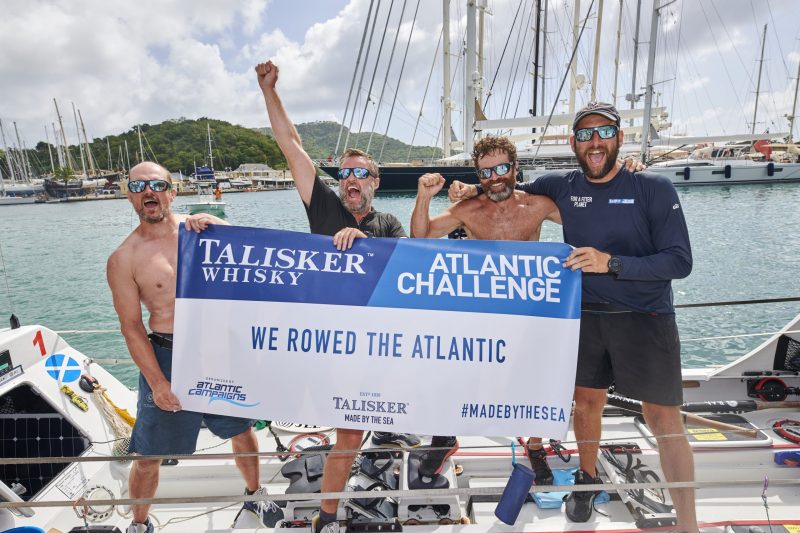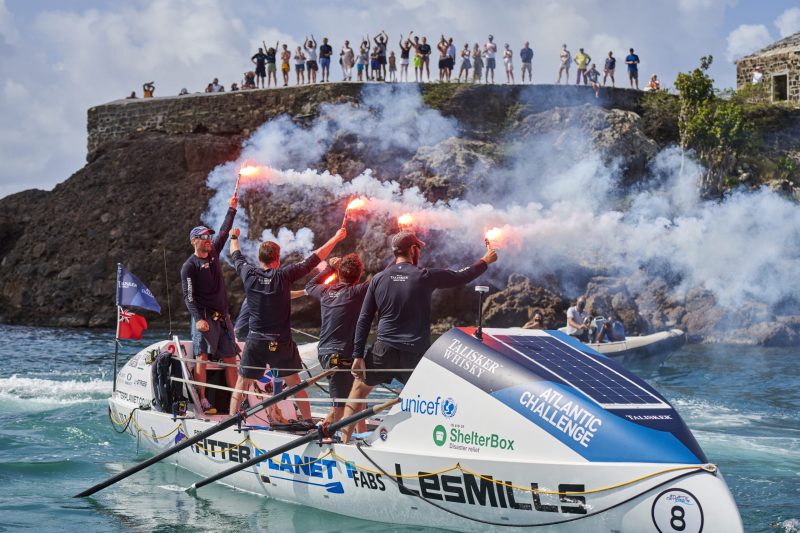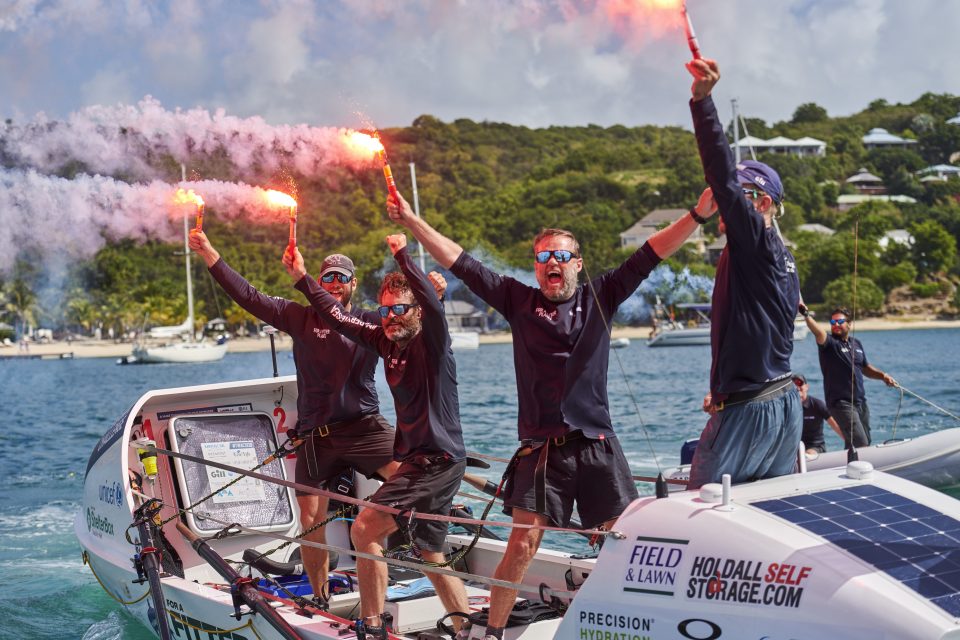Jakarta resident and Country Head of JLL, the largest commercial real estate service provider in Indonesia, James Allan has found a novel way to beat the lockdown blues – he has rowed the Atlantic.
James, who is British, and his three novice crew of former university and workplace friends, have been competing in the Talisker Whisky Atlantic Challenge, an epic 3000-mile rowing race across the Atlantic. The challenge started from La Gomera in the Canary Islands and finished in Antigua in the West Indies.
After 42 days, 3 hours, and 47 minutes at sea, including Christmas and New Year, they rowed into English Harbour to a cacophony of noise. The team finished sixth overall out of 21 four-, three-, two-, and one-man crews in their 28-foot, space-age technology boat, Valkyrie.
Valkyrie is a self-righting Rannoch 45, weighing in at 1.5 tons. It’s equipped with tiny cabins fore and aft where the crew cooked, ate, slept, navigated, etc. when they were not rowing in pairs, two hours on, two hours off throughout.
By the time they reached the finish line, James his crew had already raised more than $100,000 for their nominated charities, including local charity, The Priscilla Hall Foundation. The organisation has multiple projects in Indonesia including a community centre, Shelter Box, which helps the 88 million people homeless in disaster zones throughout the world, and Workout for Water, a UNICEF charity bringing fresh water supplies to villages in East Africa.
Overall, the race was won by Dutch pair Mark Slats and Kai Wiedmar, who completed the crossing in just under 33 days.
For James, who lives in Jakarta with his wife Sylvia and daughters, Lois, 8, and Sophie, 6, it was mission accomplished after an 18-month regime of solo training in which they were able to spend less than three days together in the boat before the race because of COVID restrictions.
James said, “It wasn’t just 42 days at sea, this was an 18-month journey, a lot of training, planning and courses on things like navigation and sea survival. We hadn’t had so much as three days together in the boat because of COVID, I was in Indonesia, one guy was in Hong Kong, and two were in Yorkshire.
“We were real novices.”
The fact that they hadn’t done anything like it before is what made it such a great challenge. “We were winging it to start with but I never felt unsafe, I never felt scared and I never doubted that we were going to pull it off.
“I think what was important was that we got on that boat as good mates and stepped off it as even better mates; that’s the biggest win for us. To share that experience with the boys, that will be with us forever,” James continued.
Having also taken part in the 2002 Marathon de Sables, which is a combined six-marathon race across the Sahara Desert, he admitted, “That was a walk in the park compared to this. This was 42 days, two hours on, two hours off and we did that 255 times, pretty brutal, right? My daily six shifts pattern was 2 to 4, 6 to 8 and 10-12 am/pm.”
He explained, “You never got two hours sleep because you had to eat and admin yourself and the boat so you were lucky if you got an hour, but it was amazing how quickly we all fell into the routine. We were like robots.”
“The finish was the day I’ll never forget. The atmosphere coming in was incredible,” Allan reminisced. “We had the Antiguan Coastguard escort us in with loads of other small boats, the superyachts were sounding their horns, there were people cheering. It was all quite overwhelming to be honest.”
Separation from family was hard, as James said, ‘’We had a satellite phone on board so I could call my wife and girls Wednesdays and Saturdays, but apart from that, we had no internet networks or social media.
Looking back at the challenges he faced during the trial, he went on to say, “The real low was when we hit head winds in the middle of the race and had to put our power anchor out – we couldn’t go anywhere and then realised it was going to take three or four days longer than we had anticipated. That period was when our spirits were at their lowest.”
“Sometimes I found the night rows quite tough. When you’re getting out of your cabin and there are no stars, you can’t see the difference between the sea and the sky.” He recalled, “It’s as if you’ve stepped into a black box. You can’t see the waves and then you just get smashed by one.
“We were trying to summarise what the night rows were like and I would say it was a combination of white-water rafting, bumper cars, and turbulence in a plane all rolled into one,” he noted in good spirits. “The waves were massive; we were rowing backwards and it was like a double-decker bus coming at you. The sea goes up and down and it was like you were looking down a steep hill one moment and then you were at the bottom of it, over and over again.”
‘’Where we got real speed was when we surfed down the waves and if we caught it right, we could get up to 11.8 knots (14mph). We always tried to keep above 3 knots per hour (4mph), that way you’re doing 75-85 nautical miles (76-97 miles) a day, which is good stuff,” said James.
“We definitely took the scenic route! We saw orca whales and on the second to last day, we had an orca whale 15 metres from the boat with her baby. Another day, we saw three minke whales; they’re brown and very rare so that was fantastic,” the memories flooding back.
‘’We were also regularly slapped in the face with flying fish, we saw dolphins and one of the most amazing things I saw was a marlin flying out right next to me and chasing a smaller fish across the water, it was like watching a cartoon.’’
Despite an intake of around 5,500 calories a day, with a jet boiler to heat packet food and plenty of snacks, sweets, nuts, and protein shakes, James lost nearly a stone in weight on the journey, while crewmates Stewart dropped 1.6 stones and Burnet – who was seasick for the first two weeks – shed 2.6 stones. Stone, the biggest man on board, lost more than three stones.
James said, “Because we thought we’d do it in under 40 days, we were running out of food, we literally ate our last meals on the last day but at least we didn’t break into our emergency rations.’’
At the end James was given a compilation video of congratulatory messages from family, friends, and even famous author and much-decorated SAS veteran Andy McNab, a friend of a friend, who bantered that the former Honourable Artillery Company regiment soldier was being ‘’too Royal Marines’’.
There were also Christmas videos and letters from family and friends which gave James and the crew a huge boost during ‘’the challenge of our lives’’.




